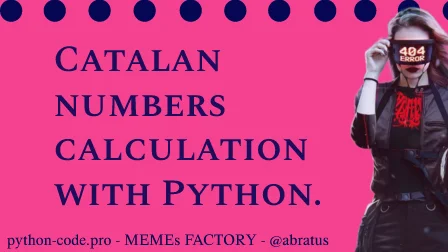Catalan numbers use case.
There are special numbers in combinatorial mathematics named after the French-Belgian mathematician Eugène Charles Catalan who studied the Towers of Hanoi puzzle.
The Catalan numbers are a sequence of natural numbers that usually describe recursively defined objects and calculated by formula:
Cn = ( ( 2n! ) / ( (n+1)! n! ) ) , where n is always non-negative.

Python Knowledge Base: Make coding great again.
- Updated:
2025-07-04 by Andrey BRATUS, Senior Data Analyst.
A recursive function to find n-th Catalan number with Python code:
Finding n-th Catalan number code result:
An example for the first Catalan numbers for n = 0, 1, 2, 3, 4, 5 are 1, 1, 2, 5, 14, 42.
Today’s practical use cases of the Catalan numbers lay in the fields of computer science, geometry, GIS and geodesy, cryptography, and medicine.
def catalan(n):
if n <= 1:
return 1
res = 0
for i in range(n):
res += catalan(i) * catalan(n-i-1)
return res
# Check
N=6
for i in range(N):
print (catalan(i),end=",")
OUT: 1,1,2,5,14,42,
